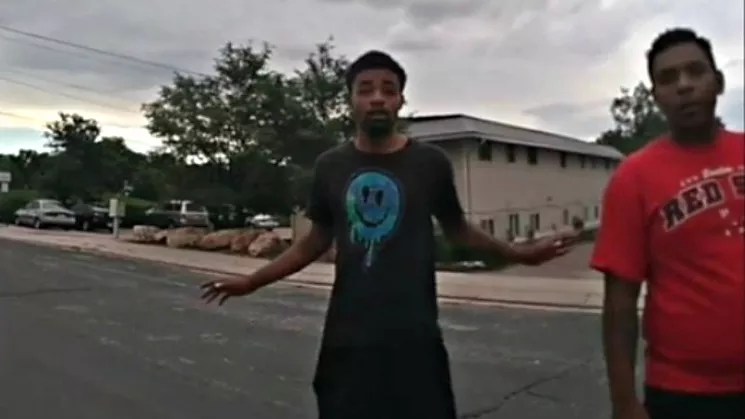
City of Colorado Springs

Audio By Carbonatix
On August 3, Colorado Springs police officers shot and killed nineteen-year-old De’Von Bailey while he was running away during an incident that generated national headlines and prompted a call by Governor Jared Polis for an independent investigation – a suggestion that was rejected by local prosecutors. And while no determination has yet been made about whether the law enforcers’ actions were legally justified, a hearing scheduled for today, September 27, is expected to question whether the cops should have rousted Bailey and his companion, Lawrence Stoker, in the first place.
As outlined in a document accessible at the end of this post, Springs attorney Daniel Kay argues that police lacked probable cause to arrest Stoker, Bailey’s nineteen-year-old cousin, after the slaying. Kay contends that the story told by Anthony Love, the man who called authorities about the pair in the first place, was so dubious that officers should never have taken it seriously, much less used it as a rationale to end a young man’s life.
The specifics of what is officially known as a motion to suppress pertain to Stoker. But when asked if many of the facts also related to Bailey, Kay says, “Absolutely, because what happened was similar to swatting” – calling police on a false claim simply for the fun of it. Although Love claimed to have been robbed at gunpoint, he continues, “Mr. Stoker was never charged with aggravated robbery, and it clearly did not occur.”
The cops in question are Officer Blake Evenson and Sergeant Alan Van’t Land, who was recently revealed to have taken part in another fatal police shooting of a fleeing suspect back in 2012. The compilation of body-camera footage from the pair is preceded by Love’s 911 call.
“So, I’m walking down the street,” he says in the recording. “There are these two black guys. One of them has a gun. They approached me, and they’re like, ‘What’s in your pockets?’ And, like, I’m basically like at first, like, I was startled, so I was really like, ‘Nothing,’ but I don’t say it like out of fear or nothing. Then they, like, then one of the guys started hitting me and I fall down to the ground, and the other guy pulls out the gun….”
Hear the entire exchange below, followed by the aforementioned body-camera footage. Video from the device worn by Van’t Land begins at around the ten-minute point, while Evenson’s starts at about 12:30. Warning: The imagery is extremely graphic.
At 6:44 p.m. on the 3rd, the document states, two other officers were informed about Love’s call. They began interviewing him at 6:52 p.m., with one of them airing descriptions of Bailey and Stoker at 6:56:40. Less than two minutes afterward, at 6:58:22, the shots that killed Bailey were fired.
The speed with which this sequence of events flew by is troubling to Kay, particularly because “Mr. Love was drunk and high while speaking to the officers, which he even admitted. And his statements were very inconsistent.”
Several examples are included in the motion. For instance, Love initially claimed that he was “walking down the street and some men just confronted me with a gun and they fought me and tried to take my belongings,” only to later concede that he grew up with Bailey and Stoker and knew them well enough to be able to tell the cops where they lived. The document also states that Love’s story of what was stolen shifted on several occasions, with the various items mentioned including a wallet, a temporary ID, a KFC card, a Social Security card, a job card and “a couple of bucks.”
Even more problematic from Kay’s perspective: He said Bailey pulled a gun on him, but when asked if he’d seen a weapon shortly thereafter, he said that he “honestly didn’t know.”
Because none of Love’s belongings were found on Stoker, he was eventually accused of third-degree assault, a misdemeanor, for allegedly starting a fight with Love. In contrast, Stoker maintains that Love swung first and he was simply defending himself, Kay says. He adds that “Mr. Love was untruthful on many levels. At best, he was untruthful. At worst, he was malicious.”
Kay sees Stoker’s prosecution in similar terms. The police’s need to come up with a reasonable rationale for the shooting is “the reason we feel he was charged. I mean, he was in custody for nine hours and interrogated for seven. Have you ever heard of someone interrogated for seven hours for misdemeanor fighting?”
The odds aren’t great that a judge will toss out the accusations against Stoker, Kay acknowledges, especially in such a high-profile matter. “It’s an uphill battle, as it is with any motion to suppress. But we think we have solid grounds for asking for it – that there was a lack of probable cause to arrest. There’s also going to be testimony from some of the officers, which we think is important.”
That’s understandable, since Kay is also among the lawyers representing the family of De’Von Bailey. Click to access Colorado v. Lawrence Stoker: Motion to Suppress for Lack of Probable Cause.